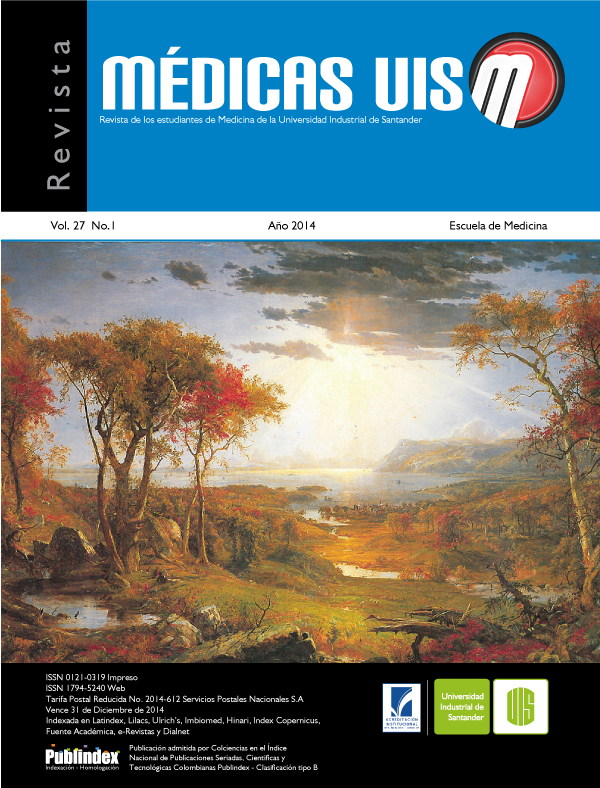Abstract
Introduction: alcohol abuse is a public health problem around the world, which causes 2.5 million deaths per year according to the World Health Organization. In Colombia, 11% of the male population older than 15 years fulfills the DSM-IV criteria for alcohol abuse, with the personal, legal and social consequences that it entails, including those associated with chronic comsumption, such as withdrawal syndrome and delírium trémens. Objective: to establish if the history of alcohol withdrawal syndrome is related to a higher risk for development of delírium trémens in patients treated by this syndrome from the city of Medellin, between August of 2010 and July of 2012. Methods: this is a retrospective cohort study, with a comparison between patients with history of alcohol withdrawal syndrome and patients in their first episode, and the development of delírium trémens and the risk factors related with this. We did a bivariate analysis of the factors with the Mann Whitney, C2 and Fisher test. Results: 67% of the patients had a history of alcohol withdrawal syndrome and 22% showed previous episodes of delírium trémens. During hospitalization 56% of the subjects developed delírium trémens. The study showed that history of withdrawal syndrome is not a risk factor for the appearance of delírium trémens (p=0.26). In contrast, the record of delirium trérmens is a risk for new episodes (p=0.02). Conclusion: the history of alcohol withdrawal syndrome appears not to be a risk factor for the development of delírium trémens in a new hospitalization. On the other hand, the history of delírium trémens was associated with new episodes of delírium. (MÉD.UIS. 2014;27(1):17-23).
References
2. Awissi DK, Lebrun G, Coursin DB, Riker RR, Skrobik Y. Alcohol withdrawal and delirium tremens in the critically ill: a systematic review and commentary. Intensive Care Med. 2013;39(1):16-30.
3. Uusaro A, Parviainen I, Tenhunen JJ, Ruokonen E. The proportion of intensive care unit admissions related to alcohol use: a prospective cohort study. Acta Anaesthesiol Scand. 2005;49(9):1236-40.
4. American Psychiatric Association. Diagnostic and statistical manual of mental disorders : DSM-IV-TR. 4a ed. Washington, DC: American Psychiatric Association; 2000. 943 p.
5. Rodríguez MA, Álvarez M, Martínez LM, Carrillo D, Mejía SA, Valencia AM, et al. Consumo de alcohol y tabaco en estudiantes de pregrado de una universidad privada de Medellín, 2007. Invest Educ Enferm. 2009;27(1):60-8.
6. MeSH[Internet]. Alcohol withdrawal delirium. Bethesda(MD): National Library of Medicine(US) [actualizado 2013 Apr 19]. Disponible en: http://www.ncbi.nlm.nih.gov/mesh/?term=alcohol+withdrawal+delirium2013
7. Beresford TP. What is addiction, what is alcoholism?. Liver Transpl. 2007;13(11 Suppl 2):S55-8.
8. Hall W, Zador D. The alcohol withdrawal syndrome. Lancet. 1997;349(9069):1897-900.
9. Wright T, Myrick H, Henderson S, Peters H, Malcolm R. Risk factors for delirium tremens: a retrospective chart review. Am J Addict. 2006;15(3):213-9.
10. Eyer F, Schuster T, Felgenhauer N, Pfab R, Strubel T, Saugel B, et al. Risk assessment of moderate to severe alcohol withdrawal--predictors for seizures and delirium tremens in the course of withdrawal. Alcohol Alcohol. 2011;46(4):427-33.
11. Fiellin DA, O’Connor PG, Holmboe ES, Horwitz RI. Risk for delirium tremens in patients with alcohol withdrawal syndrome. Subst Abus. 2002;23(2):83-94.
12. Thiercelin N, Rabiah Lechevallier Z, Rusch E, Plat A. [Risk factors for delirium tremens: a literature review]. Rev Med Interne. 2012;33(1):18-22.
13. Berggren U, Fahlke C, Berglund KJ, Blennow K, Zetterberg H, Balldin J. Thrombocytopenia in early alcohol withdrawal is associated with development of delirium tremens or seizures. Alcohol Alcohol. 2009;44(4):382-6.
14. Wetterling T, Kanitz RD, Veltrup C, Driessen M. Clinical predictors of alcohol withdrawal delirium. Alcohol Clin Exp Res. 1994;18(5):1100-2.
15. Palmstierna T. A model for predicting alcohol withdrawal delirium. Psychiatr Serv. 2001;52(6):820-3.
16. Monte R, Rabuñal R, Casariego E, López-Agreda H, Mateos A, Pértega S. Analysis of the factors determining survival of alcoholic withdrawal syndrome patients in a general hospital. Alcohol Alcohol. 2010;45(2):151-8.
17. Lee JH, Jang MK, Lee JY, Kim SM, Kim KH, Park JY, et al. Clinical predictors for delirium tremens in alcohol dependence. J Gastroenterol Hepatol. 2005;20(12):1833-7.
